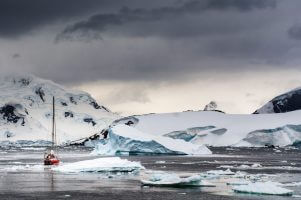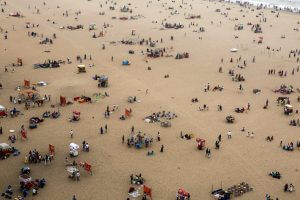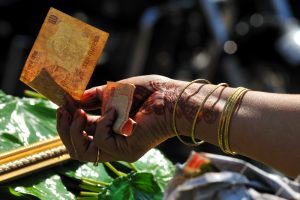Support Hidden Compass
We stand for journalism, science, history, and hope. Make a contribution to Hidden Compass and stand with us.
Half of my money was wadded up in my right sneaker. My passport was in my left. The other half of my money was in an envelope folded in my underwear, and my credit cards, family photos, and one traveler’s check were in a flimsy pouch slung around my neck and hidden beneath my clothes. I had arrived in Rome in the dead of night at the wrong train station, certain that the only reason I’d been unmolested so far was thanks to the saving grace of a small crew of ferocious Sicilian nuns who had now left me.
Stazione Sant’Oreste was dark and empty, and the echoes of my footsteps traveled for what felt like miles. The shops and ticket counters were closed; the people were gone. I waited nervously as furrow-browed station patrolman Pierre-Luis took my measure. Would he fulfill his promise to the nuns to help me? Or would he do what I could see he wanted to do, which was abandon me to whatever awaited in the night? After all, he only promised to look after me so the nuns would stop yelling and poking him in the chest with their godly, determined fingers.
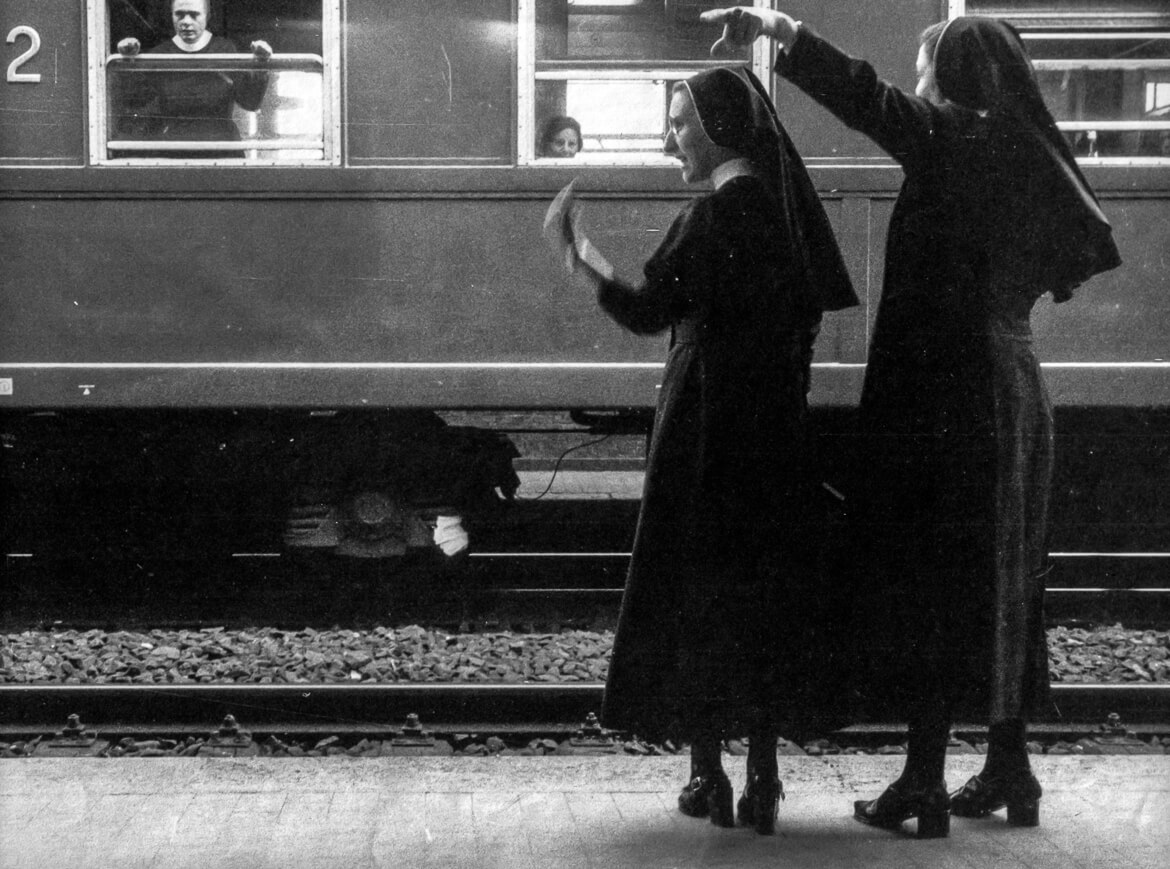
Need help at a train station in Italy? Ask a nun. PHOTO: RAINER SCHAEFFER.
~~
I’d met the holy women in a train compartment in Torino earlier in the evening. At the time, I had no idea they would be my first and fiercest allies during the kind of night that most solo female travelers dread: one where I was lost, alone, and in the wrong place at the wrong time.
I was tired from more than 20 hours of buses and trains already, and was crestfallen because I’d learned that I’d been relying on the wrong timetable: The train I had planned to take to my final destination wouldn’t arrive until the following winter. And that was only half of the problem. When I had realized my mistake, I found a payphone and used the last minutes of my calling card to contact a hostel I’d booked in Rome — hoping they would relay a message to a friend who I was meeting there. My friend, however, had not shown up, so they had canceled our reservations. I had nowhere to sleep.
But the only train to the Eternal City was about to depart, so I rushed through the station with my giant, bouncing backpack, and jammed my arm into the train door as it was closing. An irritated conductor mumbled to me in Italian, checked my Europass, and jabbed his thumb toward the sleeping compartments. The ride would be long and slow, and I needed a nap to gird myself for whatever was coming next.
The first compartment I peeked into had a family with small children, who were kicking the seats and pressing their squishy, food-smeared faces against the glass. In another there was a single man. No, thanks. I’d heard too many horror stories about solo women on Italian trains with strange men.
Finally, I clicked open the flimsy door of the last compartment and there they were — three benevolent sisters, their faintly-lined middle-aged faces beaming up at me.
“Come in, come in,” they beckoned, as if they’d been there waiting all along.
~~
The compartment was stuffy and small. I shoved my backpack onto the overhead shelf and went to the one empty seat by the window, trying to move delicately so I didn’t disturb the women’s calf-length gray skirts. I’d never been around nuns and didn’t know how to behave. Perhaps they would reject me when they learned I wasn’t Catholic. What if they used the hours-long ride to proselytize, having pinned me into the seat furthest from the door?
But they put me at ease as soon as I sat down.
Sister Arnotta, a lean woman with a sharp chin and kind eyes, spoke English. The others nodded and smiled as she translated. She showed me a beautiful prayer card with a watercolor of their quaint convent, and asked if I was Catholic. When I mumbled that I hadn’t been raised under any church, she smiled with benevolent pity and waved her hand.
“No matter,” she said.
They yelled at anyone who didn’t get out of our way, rapped strangers on shoulders to hurry them up, punctuated their Italian with sharp hand gestures, and cleared the way so I could step down from the train like I was carrying the infant Baby Jesus in my arms.
The nuns wanted to know where I was from, where I was going, why I was alone — and, finally, why did I look so sad?
I told Sister Arnotta my predicament. Her Italian translation properly conveyed the tragedy of my situation, and the other nuns clucked with sympathy and conferred amongst themselves.
“We will help you,” Sister Arnotta declared.
“Grazie,” I said gratefully, and the nuns were delighted.
I settled in and relaxed enough for a nap, grateful and content that my belongings were safe and so was my person. I wallowed just a tad, wondering where my friend had gone. But I was surrounded by nuns. Surely everything would be alright.
~~
At one o’clock in the morning, we pulled into Sant’Oreste. The small cavalcade of nuns, led by Sister Arnotta, escorted me off the train. They yelled at anyone who didn’t get out of our way, rapped strangers on shoulders to hurry them up, punctuated their Italian with sharp hand gestures, and cleared the way so I could step down from the train like I was carrying the infant Baby Jesus in my arms.
Amid the bustle of travelers, they wrangled the first polizia they saw, the young, chubby-cheeked Pierre-Luis, and sweetly beseeched him for help on my behalf, cooing and smiling as they presented me to him.
“No,” he replied, shaking his head and taking a step back. “No, no, no.”
How bedraggled could I possibly look?
But the sisters wouldn’t take no for an answer. They yelled, they poked, they invoked things. Finally, he relented. Then they blessed me, invited me to their convent in Sicily, and whirled away in a flurry of gray wool and black shoes.
~~
And now here I was, nun-less, be-backpacked, and bedraggled in an empty station with my fate in the hands of Pierre-Luis. At last he sighed and motioned for me to follow him down the platform to the police office. It was a box of a room painted in bland yellow, with economical steel desks and chairs that Mussolini might have chosen. We were alone.
On Pierre-Luis’ desk was a phone. He planted a chair next to it. In the international language of abrupt gestures, he was clearly saying, “I don’t want you here, so let’s get this over with quickly.”
After 20 minutes, I’d combed through every hostel I could afford in my Let’s Go: Europe (1995 edition) and had zero prospects. Displeased but resigned, Pierre-Luis pointed to a hard wooden bench slammed against a mustard-yellow wall. Again, the international language of abrupt gestures: I was to go over there and be quiet and disappear if at all possible. Got it. I’d be happy to.
And I did. Until Pierre-Luis’s commanding officer came in, stopped in his tracks, and began yelling at Pierre-Luis. Suddenly, I saw the poor officer for who he was — another vital ally — but I kept my mouth shut and kept trying to disappear. Two other officers came in and stared at me. I wished the wall behind me was actual mustard so I could melt into it.
After several heated moments, one of the officers roughly shook my leg: “We are leaving.”
“Can I stay here?” I asked, sitting up.
He shook his head. “You must go.” They hustled me out, backpack and all, locked the door, and jumped in a truck parked out front. They zoomed away and didn’t glance back at me. Jerks.
Little did they know that there was absolutely nowhere in this dark, deserted, freak-me-out-quiet station that I would rather be, than camped out in front of the police office. So I stayed put. I plopped my backpack on the cold concrete next to the locked door and perched myself on it. There was a single lamp above me, trapped in a metal cage, that shone feebly in the darkness. I got out my journal, wrote ad nauseam about a boy problem that I was having, and waited.
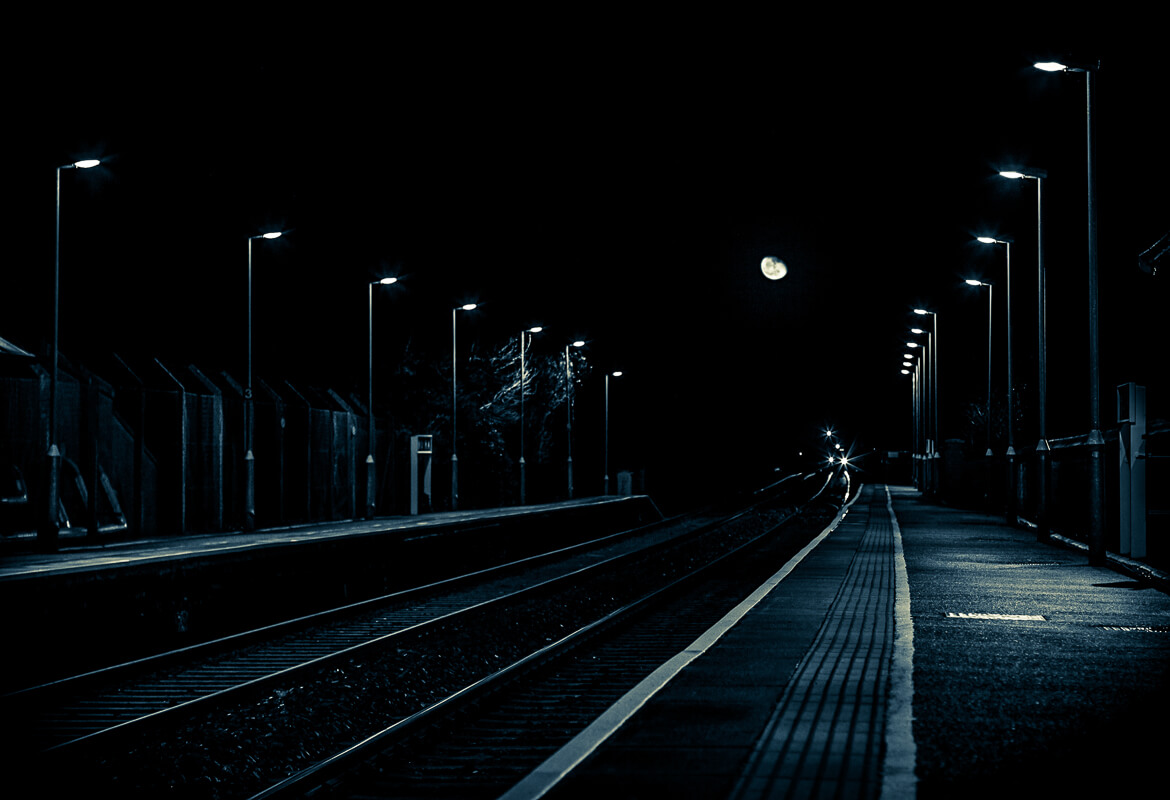
As a solo traveler in Italy, a deserted train station at night was the last place that writer Ashley Seashore wanted to find herself. PHOTO: TIM WEST.
The minutes crawled by. The light above me crackled with kamikaze bugs. I heard the rumble of a vehicle and perked up. Headlights were coming towards me. I braced myself, took count of which shoe had my passport and which had my money, and was ready to run or fight.
But, as luck would have it, I was more stubborn than the squad of polizie. The boys had returned. Grumbling, they got out of their truck and unlocked the office door. They were quiet. Resigned, even. I’d won. Sure enough, after a couple of minutes, the English-speaking officer — who I’d later learn was named Alex — emerged from the office and invited me in.
~~
We passed the night’s waning hours companionably enough. They tried to teach me Italian, asked me questions about my travels, and gave me suggestions about what to do in Rome. Just before daybreak, an off-duty officer showed up like he’d come from a club — tight black pants, fitted button-up, shiny, pointed shoes. He conferred with the officers for a moment, then turned to me.
“Would you like me to take you to the metro? The trains have started running.”
I bid a semi-fond ciao to the men who’d helped me because I didn’t give them a choice. It was too early to contemplate what the events of the night had meant, to consider how saving graces could be conjured out of crews of aggressive nuns or reluctant police. No, it was way too early for any of that, so I followed my new, shiny-shoed savior out of the office.
“So,” the man said cheerfully. “We go to the trains. But first, coffee, yes?”
My new savior, indeed.
Ashley Seashore
Ashley Seashore is a Marin County-based writer who wears flip flops with abandon.
Never miss a story
Subscribe for new issue alerts.
By submitting this form, you consent to receive updates from Hidden Compass regarding new issues and other ongoing promotions such as workshop opportunities. Please refer to our Privacy Policy for more information.

